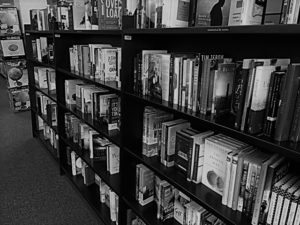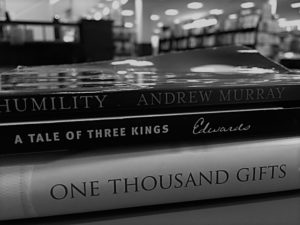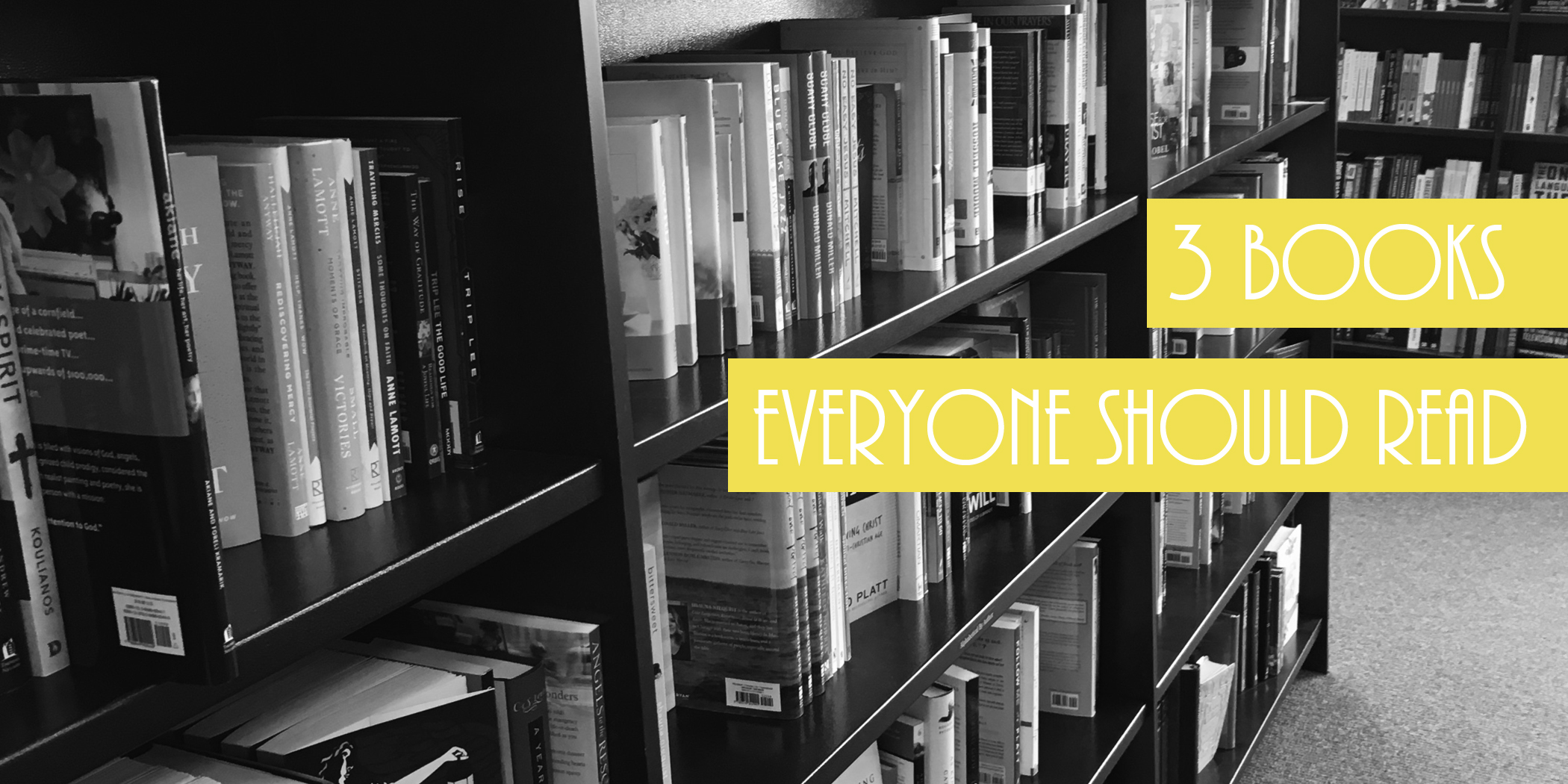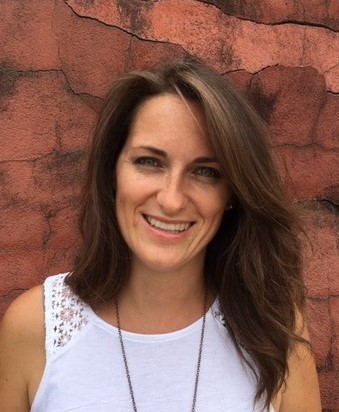I love books.
Give me a good book, a big cup of coffee and a hammock and I am in heaven. I have books stacked on my bookshelves and crammed in my nightstand and overflowing my backpack. Books are my favorite hobby, my favorite smell, my favorite lessons.
So keeping this list to only 3 was not easy. There are some that I can’t believe I’m leaving off this list because they were that impactful for me. For example, Jennie Allen’s “Restless” was nothing short of life-changing, and I recommend EVERY believer read it. Same with Ann Voskamp’s “The Broken Way”. Oh, and Bob Goff’s “Love Does” is a great one too. And I’m reading a book now that releases at the end of the summer that may just have to be added as #4 – but stay tuned, I’ll tell you more about it very soon…
The list of good books is endless. And over the years of blogging, I have often thought of writing a post to give my top recommended books, but I couldn’t quite pin down what books I really thought I should share. Until now.
Recently someone recommended a book to me and as I closed it, my thought was, “everyone needs to read this book”. (Just a heads up, it’s #3 on the list.) And with it, the list was complete.
These three books are the ones that have had the most impact on me, not just in the season in which I read them, but the biblical truths found in these pages have altered my thinking. They have challenged me, they have grown me and in each of their own ways, they have deeply offended some part of myself that needed offending.
I will share them in the order I read them, and not much of the first two as I have already told you a little about each of them here, and here.
#1. “One Thousand Gifts“, Ann Voskamp
I first read this book several years ago as I was coming out of a hard season of pain and loss and sickness and restoration and healing and disappointment and hope. I know, those words don’t really seem like they could all describe one season at the same time, but they do.
I had always heard and read about the sovereignty of God in church, but never really understood what that meant. I still don’t really. I’ve barely even scratched the surface. But when I read this book – the story of a middle-aged farm girl who was challenged to count, to list 1,000 things she is thankful for – something clicked. And I found that gratitude cannot be confined to only those things that are seemingly good or easy or happy. This book opened my eyes to a new way of seeing. As Ann says on page 91, “Without God’s Word as a lens, the world warps.”
When I see only through the lens of my circumstances, my pain, my heartbreak, I don’t truly see God’s redemption story. I only see loss. But when I change my perspective and look at things from Heaven’s perspective, I see a beautiful tapestry.
But to read more of how this book really wrecked me and my theology and my whole way of thinking, read my original review. But better yet, get the book for yourself and let it root out any ungratefulness lurking in your heart.
Warning: It’s very poetic. Like sentence fragments and very few pronouns. But it’s worth it. If you can muscle through the poeticism (which I find incredible beautiful and soothing) and see the depth of truth in this book, I would wager that you’ll never be the same.
#2. “Humility“, Andrew Murray
“Humility is the only soil in which virtue takes root; a lack of humility is the explanation of every defect and failure. Humility is not so much a virtue along with the others, but is the root of all, because it alone takes the right attitude before God and allows Him, as God, to do all.”
Listen, this book isn’t for the faint of heart. This tiny book came to me free from a giveaway, but ultimately at a great price.
My pride.
Pride, by nature can’t see itself. This is why so many of us are running around waving it like a banner but have no idea. I remember the day, very vividly, that I first discovered this unfortunate character flaw in myself. And whoa, what a rollercoaster since. It is a constant battle, a daily dying to myself and regular failing. Constant repenting and apologizing and restarting. But embracing humility, surrendering to the very One who is “gentle and humble in heart” (Matt. 11:29) has opened up my eyes and my heart to grace, to freedom, to peace that truly does surpass understanding.
This book needs to come with a couple of warnings: First, it’s old. Andrew Murray lived from 1828-1917 so you can imagine he spoke a little differently than we do now. But there are many versions that have been adapted to modern language. Another warning: Read it for yourself. It is so easy to read things and think, “oh man, HE really needs to read this” or “that sounds so much like HER“. I urge you to open the pages ready to change, ready to uncover areas of your heart that may have succumbed to the poison of pride. And then pray Psalm 139:23-24 as you read.
Last warning: Prepare to be opposed. “God opposes the proud but gives grace to the humble.” (James 4:6) Ask God to do this. Remember, when we ask God to oppose us in any area we have pride, we shouldn’t be surprised with He does. Not all opposition is from the enemy.
#3. “A Tale of Three Kings: A Study in Brokenness” Gene Edwards
Ya’ll, can I just confess that I wept through almost this entire book? I once stumbled upon a recommendation of it by one of my favorite bible teachers, so I finally bought it. My husband and I both opened it up recently and neither one of us could even get past the Dedication Page. We both were in tears and had to set it back down. A portion of the Dedication read this:
“To all brokenhearted Christians: May you be so utterly healed that you can still answer the call of him who asks for all because he is all.”
This book is unlike any I usually read. It is a narrative. It explains the dynamic of the interactions between the biblical characters Saul, David and Absalom. It addresses the concept of “spear throwing”, (referring to the time Saul threw a spear at David in 1 Samuel 18:6-16). I don’t want to give away the entire book, although you can go and read the account in first and second Samuel for yourself, but Edwards tells the story in a way that makes you look in your own heart and ask why you see people and situations a certain way. It made me stop and ask God, “could it be that any given situation isn’t so wrong or bad, maybe it is the way you have planned and ordained to mete the spirit of Saul – or Absalom – out of my heart.
Edwards starts and ends a couple of the chapters with, “I did not like that last chapter…” or “You probably didn’t like the answer in this one…”. And it was true, so many of the things I read, I hated. But knew they were so incredibly and profoundly significant. And that if we in the Church today, could take these truths and examples and walk out our faith and whatever calling God has given us to fulfill, with this message planted firmly into our hearts, I think we could find an even greater level of unity in the Body of Christ.
I will give you just a snippet of what, in my mind, sums up the gist of the book so well.
From chapter 7:
“You can easily tell when someone has been hit by a spear. He turns a deep shade of bitter. David never got hit. Gradually, he learned a very well-kept secret. He discovered three things that prevented him from ever being hit.
One, never learn anything about the fashionable, easily mastered art of spear throwing. Two, stay out of the company of spear throwers. And three, keep your mouth tightly closed. In this way, spears will never touch you, even when they pierce your heart.”
Ya’ll. If I could quote everything in this book that was profound for me, I’d just have to plagiarize the whole thing. But I highly recommend anyone read it. Even if you’ve never dealt with messy situations involving other believers (then you either don’t know any other believers or you’re lying to yourself) this is a great resource to have in the occasion of any conflict. Because if you are human, and you have relationships with other humans (even if you all love Jesus) you are going to have conflict. So please, especially if you find yourself heart-broken by other believers or “the Church”, read this…and be free.
This one doesn’t really come with a warning, other than it is really short and you may be super disappointed that you got through it so quick. I started it at 6pm one night and finished at 10am the next morning. It was that good.
So there you have it. My three books. I wish I could add more, but these are the ones. Gratitude, Humility and Forgiveness. These are three things that could radically transform the Church today. And ultimately the world.
Starting with you and I.
Happy Reading!
I’d love to hear what your top reads are in the comments below…


Excellent reviews! Thanks for sharing!